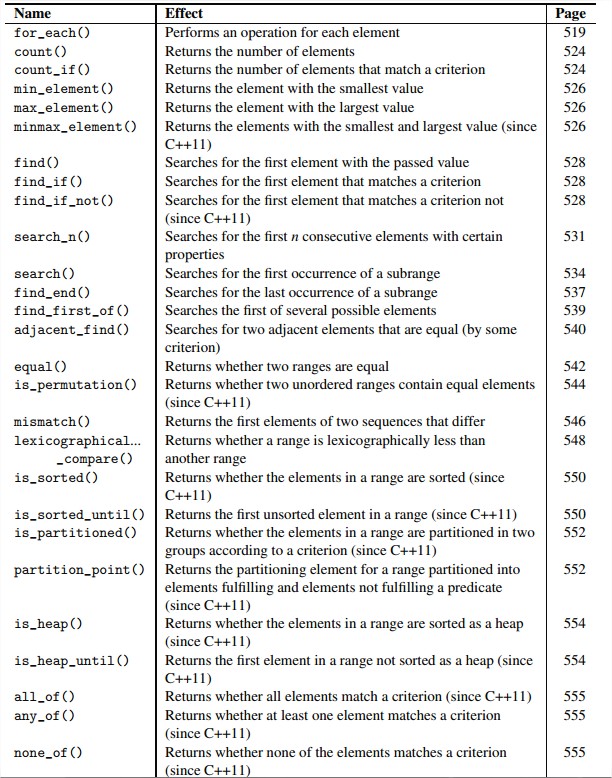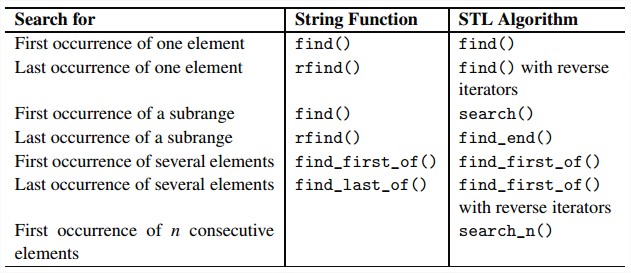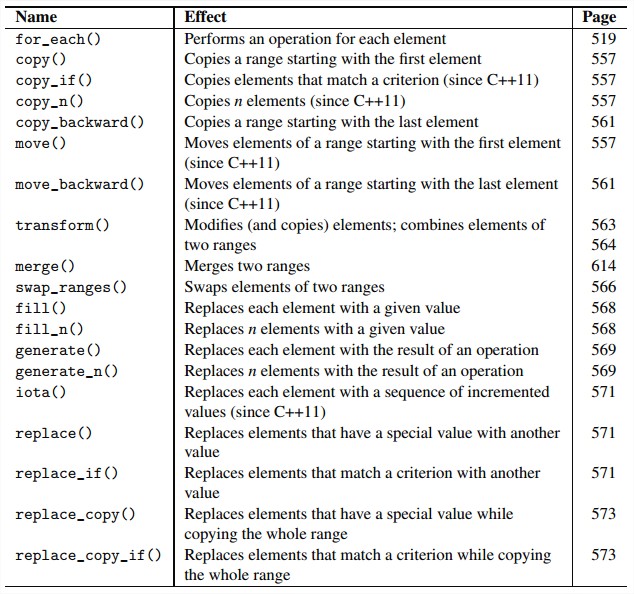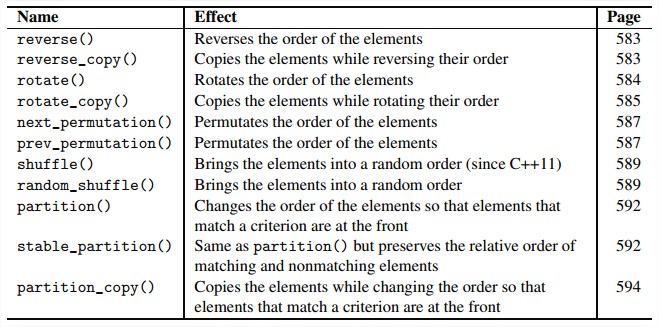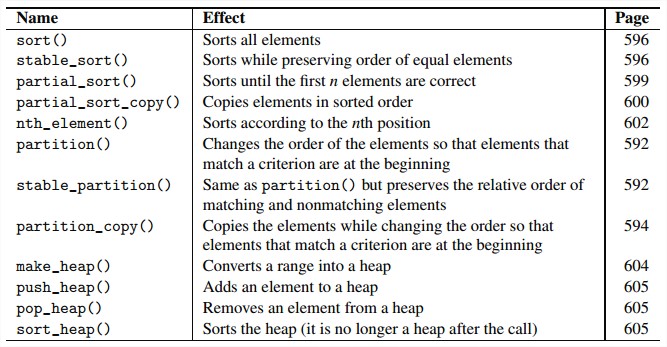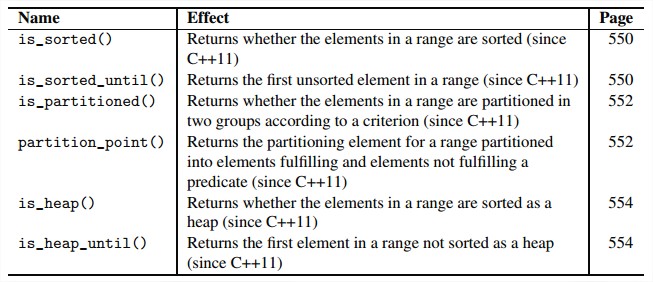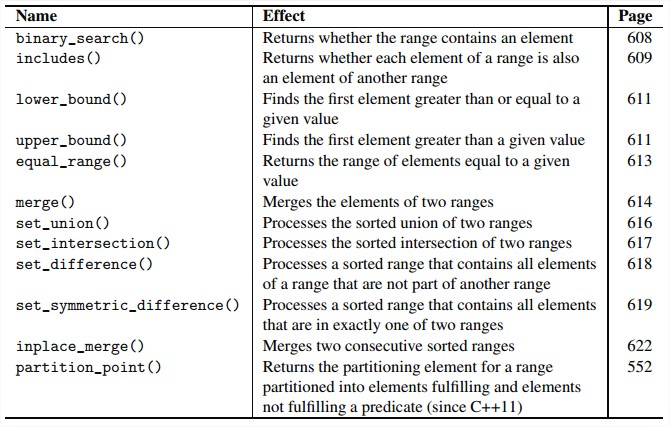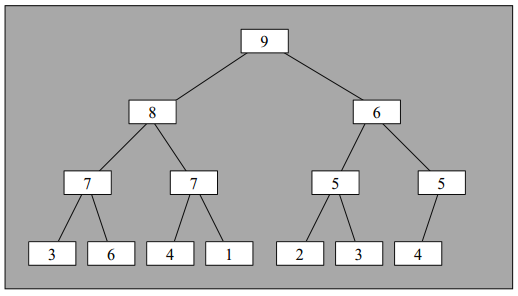1
2
3
4
5
6
7
8
9
10
11
12
13
14
15
16
17
18
19
20
21
22
23
24
25
26
27
28
29
30
31
32
33
34
35
36
37
38
39
40
41
42
43
44
45
46
47
48
49
50
51
52
53
54
55
56
57
58
59
60
61
62
63
64
65
66
67
68
69
70
71
72
| // Nonmodifying Algorithms
// -----------------------------------
// Counting Elements
// -----------------------------------
difference_type count (InputIterator beg, InputIterator end, const T& value)
difference_type count_if (InputIterator beg, InputIterator end, UnaryPredicate op)
// -----------------------------------
// Minimum and Maximum
// -----------------------------------
ForwardIterator min_element (ForwardIterator beg, ForwardIterator end)
ForwardIterator min_element (ForwardIterator beg, ForwardIterator end, CompFunc op)
ForwardIterator max_element (ForwardIterator beg, ForwardIterator end)
ForwardIterator max_element (ForwardIterator beg, ForwardIterator end, CompFunc op)
pair<ForwardIterator, ForwardIterator> minmax_element(ForwardIterator beg, ForwardIterator end)
pair<ForwardIterator, ForwardIterator> minmax_element(ForwardIterator beg, ForwardIterator end, CompFunc op)
// -----------------------------------
// Searching Elements
// -----------------------------------
// - Search First Matching Element
InputIterator find (InputIterator beg, InputIterator end, const T& value)
InputIterator find_if (InputIterator beg, InputIterator end, UnaryPredicate op)
InputIterator find_if_not (InputIterator beg, InputIterator end, UnaryPredicate op)
// - Search First n Matching Consecutive(连贯的) Elements
ForwardIterator search_n (ForwardIterator beg, ForwardIterator end, Size count, const T& value)
ForwardIterator search_n (ForwardIterator beg, ForwardIterator end, Size count, const T& value, BinaryPredicate op)
// - Search First Subrange
ForwardIterator1 search (ForwardIterator1 beg, ForwardIterator1 end, ForwardIterator2 searchBeg, ForwardIterator2 searchEnd)
ForwardIterator1 search (ForwardIterator1 beg, ForwardIterator1 end, ForwardIterator2 searchBeg, ForwardIterator2 searchEnd, BinaryPredicate op)
// - Search Last Subrange
ForwardIterator1 find_end (ForwardIterator1 beg, ForwardIterator1 end, ForwardIterator2 searchBeg, ForwardIterator2 searchEnd)
ForwardIterator1 find_end (ForwardIterator1 beg, ForwardIterator1 end, ForwardIterator2 searchBeg, ForwardIterator2 searchEnd, BinaryPredicate op)
// - Search First of Several Possible Elements
InputIterator find_first_of (InputIterator beg, InputIterator end, ForwardIterator searchBeg, ForwardIterator searchEnd)
InputIterator find_first_of (InputIterator beg, InputIterator end, ForwardIterator searchBeg, ForwardIterator searchEnd, BinaryPredicate op)
// - Search Two Adjacent, Equal Elements
ForwardIterator adjacent_find (ForwardIterator beg, ForwardIterator end)
ForwardIterator adjacent_find (ForwardIterator beg, ForwardIterator end, BinaryPredicate op)
// -----------------------------------
// Comparing Ranges
// -----------------------------------
// - Testing Equality
bool equal (InputIterator1 beg, InputIterator1 end, InputIterator2 cmpBeg)
bool equal (InputIterator1 beg, InputIterator1 end, InputIterator2 cmpBeg, BinaryPredicate op)
// - Testing for Unordered Equality
bool is_permutation (ForwardIterator1 beg1, ForwardIterator1 end1, ForwardIterator2 beg2)
bool is_permutation (ForwardIterator1 beg1, ForwardIterator1 end1, ForwardIterator2 beg2, CompFunc op)
// - Search the First Difference
pair<InputIterator1, InputIterator2> mismatch (InputIterator1 beg, InputIterator1 end, InputIterator2 cmpBeg)
pair<InputIterator1, InputIterator2> mismatch (InputIterator1 beg, InputIterator1 end, InputIterator2 cmpBeg, BinaryPredicate op)
// - Testing for "Less Than"
bool lexicographical_compare (InputIterator1 beg1, InputIterator1 end1, InputIterator2 beg2, InputIterator2 end2)
bool lexicographical_compare (InputIterator1 beg1, InputIterator1 end1, InputIterator2 beg2, InputIterator2 end2, CompFunc op)
// -----------------------------------
// Predicates for Ranges
// -----------------------------------
// - Check for (Partial) Sorting
bool is_sorted (ForwardIterator beg, ForwardIterator end)
bool is_sorted (ForwardIterator beg, ForwardIterator end, BinaryPredicate op)
ForwardIterator is_sorted_until (ForwardIterator beg, ForwardIterator end)
ForwardIterator is_sorted_until (ForwardIterator beg, ForwardIterator end, BinaryPredicate op)
// - Check for Being Partitioned
bool is_partitioned (InputIterator beg, InputIterator end, UnaryPredicate op)
ForwardIterator partition_point (ForwardIterator beg, ForwareIterator end, BinaryPredicate op)
// - Check for Being a Heap (Maximum Element First)
bool is_heap (RandomAccessIterator beg, RandomAccessIterator end)
bool is_heap (RandomAccessIterator beg, RandomAccessIterator end, BinaryPredicate op)
RandomAccessIterator is_heap_until (RandomAccessIterator beg, RandomAccessIterator end)
RandomAccessIterator is_heap_until (RandomAccessIterator beg, RandomAccessIterator end, BinaryPredicate op)
// - All, Any, or None
bool all_of (InputIterator beg, InputIterator end, UnaryPredicate op)
bool any_of (InputIterator beg, InputIterator end, UnaryPredicate op)
bool none_of (InputIterator beg, InputIterator end, UnaryPredicate op)
|
